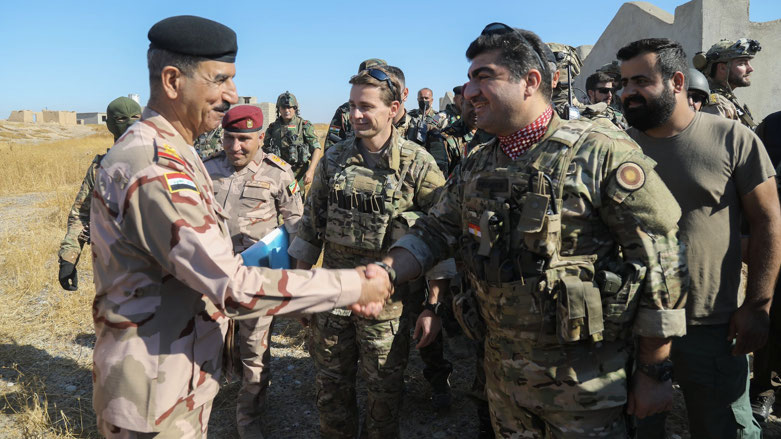Peshmerga still adept at counter-ISIS operations: coalition
"These operations included presence patrols and clearance patrols, maintenance of observation posts and temporary checkpoints, and reconnaissance missions."

ERBIL (Kurdistan 24) – The Kurdish Peshmerga and Asayish security forces have proven adept in countering Islamic State (ISIS) sleeper cells, a Pentagon watchdog said on Thursday.
The Pentagon Inspector General (IG) report covering the quarter of July 1, 2021 – September 30, 2021 said the coalition reported that the Peshmerga maintained the ability to conduct successful counter-ISIS operations.
Successful counter-ISIS operations
It said that the Counter Terrorism Directorate (CTD) and Asayish units in particular had proven “adept” at identifying and detaining ISIS sleeper cells operating in the Kurdistan Region. These units disrupted three cells during that quarter.
Moreover, the coalition reported that the Peshmerga has also provided a significant quantity of intelligence on ISIS operations.
The report also noted that the Ministry of Pesherga-affiliated Regional Guard Brigades carried out most of the daily, low-level, and routine counter-ISIS operations across the Kurdistan Region.
“These operations included presence patrols and clearance patrols, maintenance of observation posts and temporary checkpoints, and reconnaissance missions,” the report said.
According to coalition statistics, the Peshmerga executed 878 independent operations as of Sept. 22. Only a few of these missions were carried out in cooperation with the coalition or the Iraqi Security Forces. The Peshmerga also didn’t carry out any missions in cooperation with the Iraqi Counter-Terrorism Services (CTS) in that quarter.
Last Saturday, however, Iraqi and Peshmerga forces carried out a rare joint operation in the disputed territory of Makhmour.
All ISIS cells were neutralised in that joint operation, which covered an area spanning 5 kilometers, General Sirwan Barzani, the Peshmerga Commander at the Gwer-Makhmour said in a tweet on Sunday.
Read More: Iraqi security forces, Peshmerga launch joint anti-ISIS operation in disputed Makhmour
The report noted that the decrease in the number of joint operations between the coalition and the Peshmerga is consistent with the coalition’s transition from a combat mission in Iraq to a strictly advisory one by Dec. 31, 2021.
Joint brigades
The coalition also said that patrolling disputed areas is a “chief concern” and that both the Ministry of Peshmerga and the Iraqi Army have verbally agreed to establish the joint brigades. However, they still have yet to formalize the agreement in writing.
Security in disputed regions between Baghdad and Erbil deteriorated significantly after Iraqi forces and Iran-backed Popular Mobilization Force (PMF) paramilitaries seized Kirkuk and other disputed territories from the Peshmerga in October 2017, a month after the Kurdistan Region's September 2017 independence referendum.
Since then, there have been security gaps between the positions held by the Peshmerga stationed near the Qarachukh mountains and the Iraqi Army. In some areas, these gaps are between three to five kilometers wide.
According to the US-led coalition, joint Iraqi-Peshmerga operations will “ensure a clear command responsibility for operating in the disputed areas and minimize opportunities for ISIS to operate with impunity.”
In the meantime, the Peshmerga and ISF continue efforts to set up four Joint Coordination Centers in Diyala, Kirkuk, and Ninewa provinces, as well as the Makhmur district of Erbil province. However, these are not operating well due to a lack of clarity of the roles and responsibilities of the officers assigned to them.
A fifth joint center located in Erbil city is staffed with six ISF liaison officers and six Peshmerga liaison officers, but remains underused and in need of staff from both sides.
Peshmerga Unification
The report noted that the Ministry of Peshmerga continues to transfer troops from the Peshmerga Unit 70 and 80 brigades, which are respectively controlled by the Kurdistan Democratic Party (KDP) and the Patriotic Union of Kurdistan (PUK), to the non-partisan Regional Guard Brigades. According to coalition data, at least 5,500 Peshmerga troops were transferred from the KDP’s Unit 70 and that there are plans to transfer units from the PUK’s Unit 80 too.
“The personnel transferred from the 70s and 80s Units will form two new Regional Guard Brigades instead of being dispersed among existing brigades,” the coalition said.
The coalition also said that its Ministry of Peshmerga Affairs (MoPA) is limiting the transfer from partisan units due to a quarterly $60 million limit on US-paid stipends to the Peshmerga.
In the quarter of July 1, 2021 – September 30, 2021, the coalition disbursed just over $49 million in stipends to the unified Regional Guard Brigades. This vast amount could increase as more Peshmerga are transferred to the unified brigades.
“If more partisan forces from the 70s and 80s Units transfer to the Regional Guard Brigades and become eligible for stipends, the stipend fund will exceed the stipend limit unless the stipend amount received per Peshmerga soldier decreases or the stipend ceiling is raised,” the report said.
According to the coalition the KDP’s 80s Unit was estimated at 65,000 to 70,000 personnel, while the PUK’s 70s Unit was estimated at 45,000 to 50,000 personnel.
Kurdistan Region Prime Minister Masrour Barzani recently said, at the MERI Forum 2021 on Oct. 27, that the Kurdish government has made significant progress with peshmerga reform.
Read More: Kurdistan Region PM outlines current key KRG policies at MERI Forum 2021
“We are glad with what's happened, especially during this cabinet in the last couple of years. There has been some – let's say – good improvement,” he said.